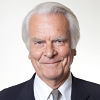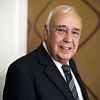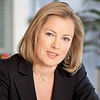Structure & people
The Daedalus Trust comprised a Board of Trustees, an Advisory Group and a small administration. The Board oversaw activities and projects. The Advisory Group acted as an honorary and voluntary interdisciplinary forum that advised the Trustees on all Daedalus Trust activities.
Daedalus Trust – Trustees
Reflecting the multi-disciplinary nature of the topic, our Trustees and Advisory Group members included eminent names from many different strands of academia, business, human relations, the media, neurology, politics, psychology and psychiatry.
The Rt Hon Lord David Owen CH FRCP
Back to the top Lord Owen is a doctor by training and was neurology and psychiatric registrar at St Thomas’s Hospital, London, before becoming a Research Fellow. He then entered politics and under Labour Governments served as Navy Minister, Health Minister and Foreign Secretary. He co-founded the Social Democratic Party and was its leader from 1983-1990. From 1992-1995 he served as EU peace negotiator in the former Yugoslavia. He now sits as an independent social democrat in the House of Lords. Lord Owen is a Director of the Center for International Humanitarian Cooperation and was Chancellor of Liverpool University from 1996-2009.
Lord Owen is a doctor by training and was neurology and psychiatric registrar at St Thomas’s Hospital, London, before becoming a Research Fellow. He then entered politics and under Labour Governments served as Navy Minister, Health Minister and Foreign Secretary. He co-founded the Social Democratic Party and was its leader from 1983-1990. From 1992-1995 he served as EU peace negotiator in the former Yugoslavia. He now sits as an independent social democrat in the House of Lords. Lord Owen is a Director of the Center for International Humanitarian Cooperation and was Chancellor of Liverpool University from 1996-2009.
Lord Owen has long been interested in the inter-relationship between politics and medicine and the key books and articles he has written on this subject are ‘Hubris Syndrome: An Acquired Personality Disorder?’, Brain 2009, In Sickness and In Power: Illness in Heads of Government since 1900 (revised e-edition, 2014), The Hubris Syndrome (revised edition, 2012) and ‘Hubris in leadership: A peril of unbridled intuition?’, Leadership 2013.
Lord Chandos: Baron Lyttelton of Aldershot (Life Peer) 2000
Back to the top Tom Chandos is the third Viscount succeeding his father in 1980. He lost his seat in the House of Lords after the passing of the House of Lords Act of 1999, which removed the automatic right of hereditary peers to sit in the upper chamber of Parliament. However, in 2000 he was given a life peerage as Baron Lyttleton of Aldershot, of Aldershot in the County of Hampshire, and was able to return to the House of Lords, where he now sits on the Labour benches. From 1995-97 he was opposition spokesman on Treasury matters.
Tom Chandos is the third Viscount succeeding his father in 1980. He lost his seat in the House of Lords after the passing of the House of Lords Act of 1999, which removed the automatic right of hereditary peers to sit in the upper chamber of Parliament. However, in 2000 he was given a life peerage as Baron Lyttleton of Aldershot, of Aldershot in the County of Hampshire, and was able to return to the House of Lords, where he now sits on the Labour benches. From 1995-97 he was opposition spokesman on Treasury matters.
Tom Chandos has a background in investment banking and venture capital and former directorships have included Kleinwort Benson; Botts Co Ltd; Cine-UK Ltd; Invista European Real Estate Trust and Queen’s Walk Investment Ltd. He currently holds directorships with Simon Robertson Associates, Splash Media TV, ENO and the National Film and Television School. In addition to the Daedalus Trust he is a Trustee of the Esmeé Fairbairn Foundation.
Professor Lord Skidelsky
Back to the top Lord Skidelsky is Emeritus Professor of Political Economy at the University of Warwick. His three volume biography of the economist John Maynard Keynes (1983, 1992, 2000) received numerous prizes, including the Lionel Gelber Prize for International Relations and the Council on Foreign Relations Prize for International Relations. He is the author of the The World After Communism (1995) (American edition called The Road from Serfdom).
Lord Skidelsky is Emeritus Professor of Political Economy at the University of Warwick. His three volume biography of the economist John Maynard Keynes (1983, 1992, 2000) received numerous prizes, including the Lionel Gelber Prize for International Relations and the Council on Foreign Relations Prize for International Relations. He is the author of the The World After Communism (1995) (American edition called The Road from Serfdom).
In the 1980s, he became a founder member of the Social Democratic Party (SDP), becoming a life peer in 1991. He remained in the party till its dissolution in 1992 and subsequently joined the Conservatives. He was made Chief Opposition Spokesman in the Lords, first for Culture, then for Treasury Affairs (1997-9), but he was sacked by the then Conservative party leader, William Hague, for publicly opposing Nato’s bombing of Kosovo. In 2001, he left the Conservative Party for the Crossbenches..
Lord Skidelsky holds a number of directorships; chairman of the Centre for Global Studies and a member of the Advisory Board of the Institute of New Economic Thinking.
Gillian Tett
Back to the top Gillian Tett is a British author and award-winning journalist at the Financial Times, where she is a markets and finance columnist and U.S. Managing Editor.
Gillian Tett is a British author and award-winning journalist at the Financial Times, where she is a markets and finance columnist and U.S. Managing Editor.
In 1993, Tett joined the Financial Times as a correspondent from the former Soviet Union and Europe. In 1997, she was posted to Tokyo, where she later became bureau chief. In 2003, she became deputy head of the influential Lex column. During the years 2005–2007, Tett applied her skills in ethnographic research to J.P. Morgan and discovered that the insular culture was leading to the creation of financial instruments that had little basis and that could cause severe economic disruption. In 2006, she predicted the financial crisis. Her book Fool’s Gold: How Unrestrained Greed Corrupted a Dream, Shattered Global Markets and Unleashed a Catastrophe recounts the lead-up to the economic crisis and the eventual collapse and she won the Spear’s Book Award for the financial book of 2009.
In 2014, Tett was named Columnist of the Year in the British Press Awards. She is chairwoman of the board of trustees for the Knight–Bagehot Fellowship in Economics and Business Journalism with Columbia University.
http://search.ft.com/search?queryText=Gillian+Tett
Professor Peter Garrard
Back to the top Prof. Garrard is very active in neuroscience research in the University of London: he is Professor of Neurology at St George’s Hospital Medical School and Deputy Director of the Molecular and Clinical Sciences Research Institute, where he leads an internationally competitive dementia research laboratory. Before moving to St George’s in 2010 Prof. Garrard held senior academic positions at University College London and the University of Southampton.
Prof. Garrard is very active in neuroscience research in the University of London: he is Professor of Neurology at St George’s Hospital Medical School and Deputy Director of the Molecular and Clinical Sciences Research Institute, where he leads an internationally competitive dementia research laboratory. Before moving to St George’s in 2010 Prof. Garrard held senior academic positions at University College London and the University of Southampton.
His paper, “Linguistic biomarkers of Hubris Syndrome” was published in the September 2014 edition of Cortex. Prof. Garrard and his team studied whether power changed speech and analysed words used by three Prime Ministers – Thatcher, Major and Blair – during Prime Minister’s Questions in Parliament. The number of “linguistic biomarkers” associated with hubris was highest for Mr Blair, followed by Thatcher – with Mr Major a long way behind. Hubris increased both in the speeches of Mr Blair and of Thatcher – with a particularly marked rise after periods of war.
Dr John Coates
Back to the top Dr. John Coates, Research Fellow in Neuroscience and Finance at the University of Cambridge, previously traded derivatives for Goldman Sachs and ran a trading desk for Deutsche Bank. He developed techniques for valuing and arbitraging the tails of probability distributions, and for trading low probability events such as financial crises. He now researches the biology of risk taking and stress.
Dr. John Coates, Research Fellow in Neuroscience and Finance at the University of Cambridge, previously traded derivatives for Goldman Sachs and ran a trading desk for Deutsche Bank. He developed techniques for valuing and arbitraging the tails of probability distributions, and for trading low probability events such as financial crises. He now researches the biology of risk taking and stress.
His book, The Hour Between Dog and Wolf, was short listed for the Financial Times/Goldman Sachs Business Book of the Year, and the UK Wellcome Trust Science Prize. It was also chosen book of the month by the Magazine of the British Army. His research on risk taking has attracted interest from business, medicine, the military, as well as elite sports teams. The journal, Foreign Policy, named him one of the most influential thinkers of the year.
http://johnmcoates.wordpress.com
Daedalus Trust – Advisory Group
The Advisory Group is made up of people well known in neuroscience, politics, business, management, anthropology, philosophy and history with a shared interest in the objectives of the Daedalus Trust.
The members of the Advisory Group are appointed by the Trustees. Membership is on a three year basis that can be renewed. One of the members of the Advisory Group is appointed as Chair by the Trustees on a three year basis that can be renewed.
Sally Bibb
Back to the topSally Bibb is a business consultant and writer. Her background is in international organisational development. Before setting up her consultancy, Engaging Minds, she was a director at The Economist Group, publisher of The Economist magazine.
She has an MSc in Organisational Change from the University of Surrey and is the author of several business books, including The Right Thing: An Everyday Guide to Ethics in Business (2010), A Question of Trust (with Jeremy Kourdi, 2007), Management F/Laws (with Russ Ackoff & Herb Addison (2006), Trust Matters (2004). www.engagingminds.co.uk
Dr Ricardo Blaug
Back to the topRicardo Blaug is Reader in Democracy and Political Theory at the University of Westminster’s Centre for the Study of Democracy. A professionally qualified psychiatric social worker and award-winning author and teacher of politics and political psychology, he has worked as an emergency clinician, public sector manager and democratic theorist in the UK, the US and the Netherlands.
Ricardo uses social, political and psychological theory to examine the interaction between organisational structures (hierarchies, markets, networks, democracy) and constructions of meaning (cognition, ideology, identity). His publications use contemporary psychological theory to re-examine classic political concerns such as corruption by power, democratic governance, citizen engagement and reification.
Through his membership of Research Republic Ricardo conducts academic and practical research with a range of scholars, students and public and voluntary organisations. His book ‘How Power Corrupts’ was recently released in paperback with Palgrave Macmillan and he writes a blog at www.blaug.net
Professor Nick Bouras
Back to the topNick Bouras is Coordinator of the Daedalus Trust and Chair of its Research and Development Group.
He is a professor (emeritus) of psychiatry at the Institute of Psychiatry, King’s College London and Programme Director of Maudsley International that promotes global mental health. He has long standing experience in clinical, research, organization and management of mental health services.
His research is focused on health service related topics including, effectiveness, evaluation, social and biological determinants of behaviour. He has been editor and member of the editorial board of several journals and has published extensively on mental health aspects.
Professor Niamh Brennan
Back to the topProfessor Brennan is Michael MacCormac Professor of Management and Academic Director of the UCD Centre for Corporate Governance. She holds and has held a number of significant non-executive directorships and governance positions of state and private sector organisations. Her research on Financial Reporting, Corporate Governance, Forensic Accounting and Clinical Governance is highly cited in international refereed journals.
She is a first class honours Science graduate of University College Dublin, qualified as a chartered accountant with KPMG, holds a PhD from the University of Warwick and is a Chartered Director with the Institute of Directors (London).
Niamh Brennan and her graduate student, John Conroy, analysed the letters to shareholders issued by the chief executive of a European bank for symptoms of hubris. Their paper, “Executive hubris: the case of a bank CEO” was published in the Emerald Accounting, Auditing & Accountability Journal, Vol 26 Iss: 2 pp. 172-195 (February 2013).
Arie de Geus
Back to the topAfter Arie de Geus’ retirement as Group Planning Coordinator for the Royal Dutch Shell group, his continued interest in the theory and practice of management culminated in the publication of his book “The Living Company: Habits for Survival in a Turbulent Business Environment”.
Arie’s main area of interest lies in the nature of the decision-taking process in organisations and the characteristics that allow certain companies to survive for hundreds of years while others survive for only a few. He maintains that the most enduring companies treat their enterprises as living work communities rather than purely economic machines. Over the years, his thinking has started to focus on the consequences for organisations and society where inappropriate (or inappropriately manipulated) power structures and poor decision-taking often result in organisational failure.
Since his retirement Arie has helped organisations of all kinds reorganise and prepare for their futures. He headed an advisory group to the World Bank and has been an advisor to the Office of the Auditor General in Canada and the Dutch Ministry of Transport and Communications (Rijkswaterstaat). Arie is President of the Society for Organisational Learning (UK) and a founder member of the Daedalus Trust Steering Group.
Geoff Marlow
Back to the topGeoff Marlow is a founding member of the Daedalus Trust Advisory Board.
He has over 30 years of professional experience across Europe, Asia and the US helping organisations, individuals and ideas to flourish by escaping the hidden traps holding them back.
Formerly Corporate Director of Innovation Leadership at a global consulting firm, he has been in private practice since 2001.
Previously UK Director of the Society for Organisational Learning, he was also a member of external faculty at Duke Corporate Education when it was voted the world’s #1 provider of custom executive education by both the FT and Businessweek.
He is a Chartered Engineer, a Fellow of the Institution of Engineering & Technology (FIET) and a Fellow of the Royal Society of Arts, Manufactures & Commerce (FRSA).
Sir Bob Reid
Back to the topSir Bob Reid is Chairman ICE Futures and ICE Clear Europe. He is a Director of Intercontinental Exchange Inc, Diligenta Limited, Jubilant Energy and EEA Helicopter Operations. He is Chairman of the Foundation for Young Musicians, Learning Through Landscapes and Edinburgh Business School.
Sir Bob joined Shell in 1956 and spent much of his career overseas, including posts in Brunei, Nigeria, Thailand and Australia. He was Chairman and Chief Executive of Shell UK Limited from 1985 until he retired in 1990. He was also Chairman of British Rail and Deputy Governor of the Bank of Scotland until he retired in 2004. He was born in Cupar, Fife.
Professor Ian Robertson
Back to the topIan is a writer, scientist and academic. He was founding director of Trinity College Institute of Neuroscience and has published more than 200 scientific papers and books on brain and behavior including Mind Sculpture, The Mind’s Eye, Stay Sharp and The Winner Effect which have attracted international attention and multiple translations. He holds the Chair in Psychology at Trinity College Dublin and is Visiting Professor at University College London.
Website: www.ianrobertson.org
Dr Graham Robinson
Back to the topDr Robinson is a Visiting Senior Fellow at the University of Surrey Business School where he gained his PhD in 2004. His research interests are concerned with the learning and sense-making processes of chief executives and directors with accountability for major organisational change programmes in their companies. Graham’s career has been as a business school academic in the UK and the Netherlands; a senior manager and director of two multinational i.t. companies; and Director of an organisation and management research and development consultancy. He is a Director of the Society for Organisational Learning (SOL-UK) and a founder member of the Daedalus Trust.
He is the author of several books and numerous articles on organisation design, development and related management and leadership issues. His most recent publications are, “Unsecured Ladders: Meeting the Challenge of the Unexpected”, (Palgrave-Macmillan, 2009) co-authored with John Harris. The book examines some of the reasons that may cause previously successful leaders to commit fundamental errors of judgement when confronted by unexpected events in their organisational or personal lives. He also has a forthcoming book “Leading Organizational Change: A perilous but transformative task”, co-authored with Dr Paul Tosey.
Professor Eugene Sadler-Smith
Back to the topEugene Sadler-Smith is Professor of Organizational Behaviour, at Surrey Business School. He researches intuition and hubris in management and leadership. His research has been published widely in peer-reviewed journals such as the Academy of Management Executive, British Journal of Psychology, Business Ethics Quarterly, Journal of Organizational Behaviour, Organisation Studies, etc. He is author of several books including Inside Intuition (Routledge, 2008) and The Intuitive Mind (John Wiley & Sons, 2010), and his intuition research has featured on BBC Radio 4 and in The Times. Professor Sadler-Smith’s hubris research with Lord Owen and Professor Guy Claxton has been published recently by Leadership journal: Claxton, G., Owen, D., and Sadler-Smith, E. (2014) Hubris in leadership: A peril of unbridled intuition? Leadership
Full bio: http://www.surrey.ac.uk/sbs/people/eugene_sadlersmith/index.htm
Chris Wiscarson
Back to the topChris Wiscarson currently serves as Chief Executive of the Equitable Life, having taken up that appointment in September 2009. Before that, he spent 20 years with the Lloyds Banking Group. Chris is a Fellow of King’s College London where he chaired the college’s development fund for many years. His board appointments include Lloyds Abbey Life, Scottish Widows, the National Bank of New Zealand and the Big Issue Foundation. Chris currently serves on the Seva Mandir Advisory Board in India and, in April 2012, he was appointed Chairman of the UK Friends of Seva Mandir.





